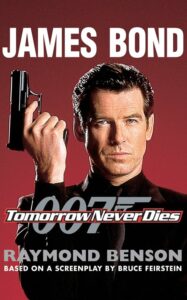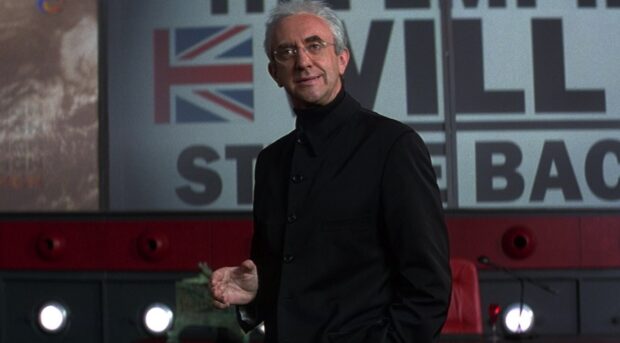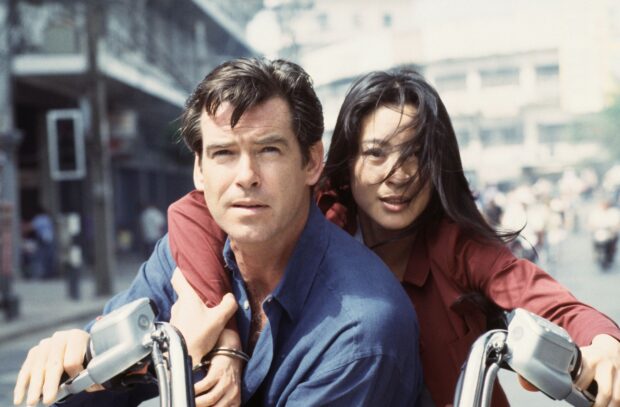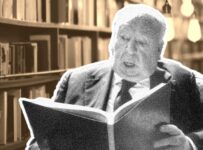Bond. James Bond. In the 007 Case Files, join me as I read all of the James Bond books, encompassing Ian Fleming and beyond. For Your Eyes Only: there’s spoilers ahead.
Cultural warning
Some quotes from Raymond Benson’s book contain references to negative depictions and/or stereotypes of people or cultures. They were wrong then and are wrong now.
Raymond Benson’s third Bond story of 1997, following the short ‘Blast from the Past’ and Zero Minus Ten, keeps a geographically similar tone to the previous outings. Like John Gardner before him, Benson’s original Bond outings were interfiled with novelisations from the film series. As such, this was Benson’s second full-length Bond novel, but the first of three adaptations he penned during his tenure.
If you’ve not seen the film, I’ll try not to spoil it for you too much here. Yes, it’s been out for 26 years, but we all come to movies at our own pace. Originally released in cinemas December 1997, it had the ill fate of going up against a little film called Titanic. Unlike its namesake, no cinematic iceberg was big enough to sink that goliath.
As Pierce Brosnan’s second outing, it had a lot to live up to following GoldenEye (1995). Where that film (and novelisation!) looked to the past, TOMORROW NEVER DIES is very much about the present. Or at least the present as viewed from 1997. Broadly, it concerns megalomaniacal media mogul Elliot Carver (played in the film by Jonathan Pryce) attempting to spark a war between China and Russia purely for the headlines and ratings. Bond teams up with Chinese operative Wai Lin (Michelle Yeoh) to stop him.
The film did well enough, despite some mixed reviews. When I last rewatched it a few years ago, I started to wonder if I still bought Brosnan as Bond. With too much of Roger Moore’s legacy hanging about, it comes closer to parody than it does classicism. It suffers in direct comparison to GoldenEye, and Brosnan’s proximity to Michelle Yeoh would make anyone seem like a prop. In fact, can we just have an entire series based on Yeoh’s character please?
Benson’s TOMORROW NEVER DIES is a pretty straight adaptation of Bruce Feirstein’s script, with a few more details on the characters plus some attempts to connect his own books and the film’s history. There’s a nod at the start to the then-recent handover of Hong Kong, the topic of Benson’s Ten Minus Zero. Poor Felix Leiter even turns up at one point, despite having been mauled by sharks at least twice if you take the film and book continuities as one.
Benson was reportedly given more freedom on this novelisation than the others, despite only having 6-8 weeks to write a novelisation. (An original was typically a year or so he later remarked in an interview). So, we learn more about Carver’s medical affiliations and being raised “by a poor Chinese family in Hong Kong,” for example.
“Sometimes you have to embellish some scenes or even add some,” said Benson in a 2007 interview, “because if you just put into prose what’s in the script, you’d be about 30,000 words too short! There is still some research involved. For example, with TOMORROW NEVER DIES, I had to do some research on Vietnam.” In the same interview, he speaks of this being his favourite adaptation, and a blink-and-you’ll-miss-it discrepancy between “between the literary Bond’s early life and what the films have said about his early life.”
Unfortunately, even though this was 1997, we can’t avoid reading some very dated descriptions of characters, especially Asian women. Yes, the term ‘almond eyes’ is used in reference to Wai Lin, who – according to Benson – also has breasts “the size of small apples.” One wonders what other aisles in the supermarket make Benson think of human anatomy. There’s also a baffling reference to “an entourage of transsexual-looking Asians.” Benson notes that Bond “never had a problem admitting that his attitudes…were old-fashioned,” but one wonders if the writer has given himself the opportunity to make the same reflections.
Yet it’s from this particular vantage point that TOMORROW NEVER DIES manages to foresee some of the future. Here is a curious musing on ‘fake news’ almost two decades before the last couple of election cycles, one that predicted a “US Civil War – Part Two” a decade away. In this way, both the film and the novelisation have become highly thematic again, even if some of those descriptors and attitudes are best left in the twentieth century.
James Bond will return…in The Facts of Death.







